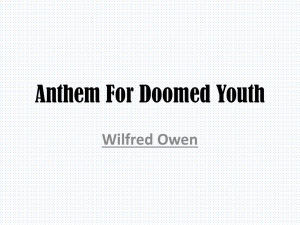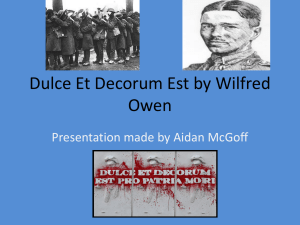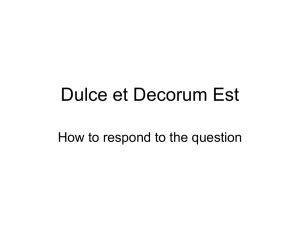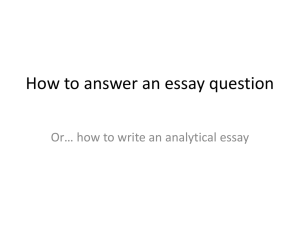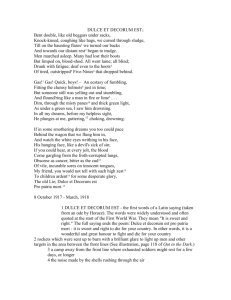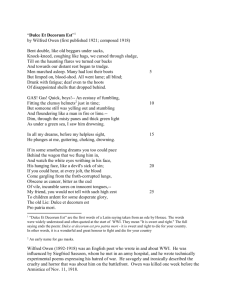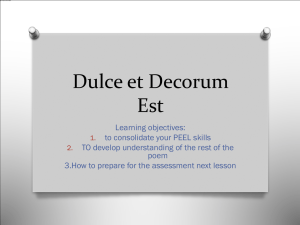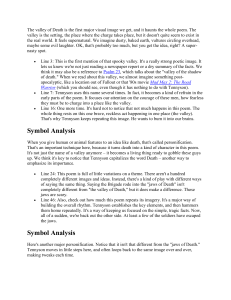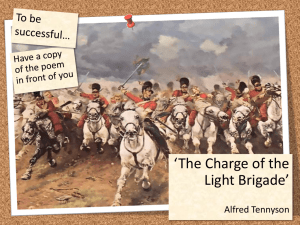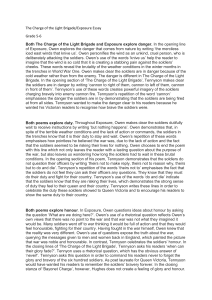War Poetry: Owen & Tennyson Study Guide
advertisement
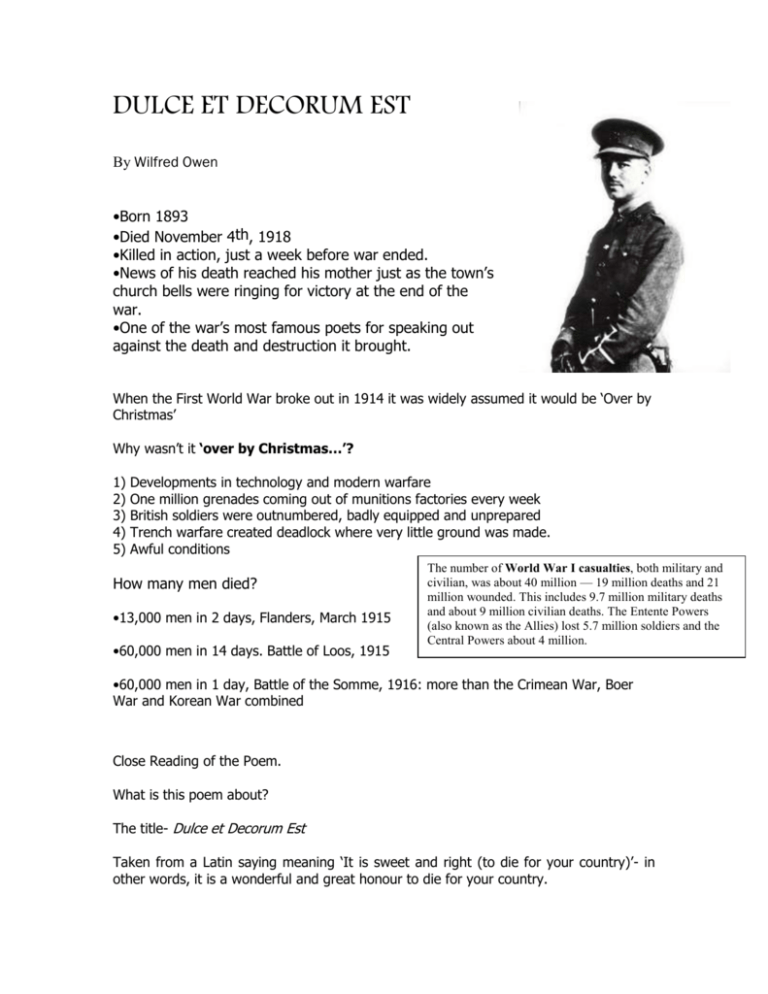
DULCE ET DECORUM EST By Wilfred Owen •Born 1893 •Died November 4th, 1918 •Killed in action, just a week before war ended. •News of his death reached his mother just as the town’s church bells were ringing for victory at the end of the war. •One of the war’s most famous poets for speaking out against the death and destruction it brought. When the First World War broke out in 1914 it was widely assumed it would be ‘Over by Christmas’ Why wasn’t it ‘over by Christmas…’? 1) 2) 3) 4) 5) Developments in technology and modern warfare One million grenades coming out of munitions factories every week British soldiers were outnumbered, badly equipped and unprepared Trench warfare created deadlock where very little ground was made. Awful conditions How many men died? •13,000 men in 2 days, Flanders, March 1915 •60,000 men in 14 days. Battle of Loos, 1915 The number of World War I casualties, both military and civilian, was about 40 million — 19 million deaths and 21 million wounded. This includes 9.7 million military deaths and about 9 million civilian deaths. The Entente Powers (also known as the Allies) lost 5.7 million soldiers and the Central Powers about 4 million. •60,000 men in 1 day, Battle of the Somme, 1916: more than the Crimean War, Boer War and Korean War combined Close Reading of the Poem. What is this poem about? The title- Dulce et Decorum Est Taken from a Latin saying meaning ‘It is sweet and right (to die for your country)’- in other words, it is a wonderful and great honour to die for your country. This was widely quoted at the beginning of the war and poems like Pope’s ‘Who’s for the Game’ reflected this idea. Who’s for the game, the biggest that’s played, The red crashing game of a fight? Who’ll grip and tackle the job unafraid? And who thinks he’d rather sit tight? Who’ll toe the line for the signal to ‘Go!’? Who’ll give his country a hand? Who wants a turn to himself in the show? And who wants a seat in the stand? Who knows it won’t be a picnic – not muchYet eagerly shoulders a gun? Who would much rather come back with a crutch Than lie low and be out of the fun? Come along, lads – but you’ll come on all right – For there’s only one course to pursue, Your country is up to her neck in a fight, And she’s looking and calling for you. We should not forget that at the time the country was in grave danger and there is normally a wave of patriotism. But compare the language of Pope’s poem to that of Wilfred Owen. Dulce et Decorum Est ‘It is sweet and right (to die for your country)’ Is this sweet? Is this right? Is this fitting? The poem describes a gas attack – mustard gas. With mustard gas the effects did not become apparent for up to twelve hours. But then it began to rot the body, within and without. •The skin blistered, the eyes became extremely painful and nausea and vomiting began. •Worse, the gas attacked the bronchial tubes, stripping off the mucus membrane. •The pain was almost beyond endurance and most victims had to be strapped to their beds. •Death took up to four or five weeks. Bent double, like old beggars under sacks, Knock-kneed, coughing like hags, we curse through sludge, Till on the haunting flares we turned our backs And towards our distant rest began to trudge. Men marched asleep. Many had lost their boots But limped on, blood-shod. All went lame; blind; Drunk with fatigue; deaf even to the hoots Of tired, outstripped Five-Nines that dropped behind. Activity 1 Owen uses lots of powerful imagery and similes to describe the soldiers. Find three examples of this and explain the effect these might have on the reader. Gas! Gas! Quick, boys! – An Ecstasy of fumbling, Fitting the clumsy helmets just in time; Activity 2 What is the impact of ‘Gas! Gas! Quick boys!’ Owen describes the soldiers putting their gas masks on as ‘an ecstasy of fumbling’. Why does he use the word ‘ecstasy’? But someone still was yelling out and stumbling, And flound’ring like a man in fire or lime... Dim, through the misty panes and thick green light, As under a green sea, I saw him drowning. In all my dreams, before my helpless sight, He plunges at me, guttering, choking, drowning. Activity 3 What is Owen describing here? What is the effect of words like ‘guttering, choking, drowning.’? If in some smothering dreams you too could pace Behind the wagon that we flung him in, And watch the white eyes writhing in his face, His hanging face, like a devil’s sick of sin; If you could hear, at every jolt, the blood Come gargling from the froth-corrupted lungs, Obscene as cancer, bitter as the cud Of vile, incurable sores on innocent tongues, Activity 4 Why does Owen describe his dreams as ‘smothering’? What is the impact of using the word ‘flung’? This is a description of a man after a gas attack, as his lungs are slowly eaten away. Which ugly words and comparisons describe this? Who do you think Owen is addressing here when he says ‘If you could hear’? My friend, you would not tell with such high zest To children ardent for some desperate glory, The old Lie; Dulce et Decorum est Pro patria mori. Activity 5 What is the tone of these final lines? How do you feel about this poem and what do you think its final message is? The Charge of the Light Brigade Alfred Tennyson was born in Somersby, Lincolnshire in 1809. He was the 4th child of 12 and was born to a rector and his wife. Descended from King Edward III of England, Tennyson should have been born to a wealthy family. However, his father was disinherited and as a result Tennyson suffered a somewhat impoverished upbringing. He began writing in 1827 and a successful writing career followed. In 1850 Tennyson succeeded William Wordsworth himself to become poet laureate. In 1855 he wrote one of his most famous poems ‘The Charge of the Light Brigade’, a highly patriotic tribute to a disastrous cavalry charge on October 25th 1854 during the Crimean war. Lord Cardigan (ordered by Lord Raglan) led 673 soldiers into a valley between Fedyukhin Heights and the Causeway Heights to fight a group of Russian soldiers at the end of the valley. However, Lord Cardigan had misunderstood Raglan’s orders. He was meant to have fought a small group on the other side of the valley but instead ended up facing 20 battalions of infantry and 50 artillery pieces. Raglan, standing at the top of the valley, had a clear view-point but the British Light Brigade could not see what he could. 118 members of the Light Brigade were killed and 127 wounded. As the armies re-grouped only 195 were still with horses and able to fight. Many saw this as an act of ‘reckless bravery’ and French Marshall Pierre Bosquet was said to have exclaimed that “it is magnificent, but it is not war”. The Russian armies even believed that the British must have been drunk. It took 3 weeks for news of the disaster to reach Britain and whilst the commanders were considered badly for their actions, the soldiers were considered as brave heroes. Modern historians tend to consider the Charge of the Light Brigade as an example of what can go wrong when military intelligence fails and orders are unclear. “The Charge of the Light Brigade” Theme: Courage and Honour, a soldier’s duty on the battlefield. Throughout the poem, the author uses repetition to show the rhythm of the marching, well as to emphasize the lesser numbers of the Light Brigade. Repetition – the repeating of sounds, letters, words, or lines, which helps give the poetry its meaning, form, and sound. “Rode the six hundred” Stanza 2 – ll. 13-15 refers to the soldier’s duty, which is to follow orders without talking back or questioning and carrying them out even if the result is death. Stanza 3 – in ll. 24-25 Tennyson makes use of metaphors He uses fiercely dramatic metaphors to describe the challenges the British soldiers face in the battle with the Russians. Metaphor – A figure of speech that makes a comparison between two seemingly unlike things Main idea in stanzas 3-6 portray the brigade’s courage against overwhelming odds through the graphic images of being surrounded by cannons. Constant loss of soldiers coupled with being completely cut off from escape shows how strong the Light Brigade’s courage was. a) Underline all the simile and metaphors in the poem. (Use different colours.) b) Choose 3 of the most effective images and complete the grid below. Image What does he mean? What effect does this create? The Two Poems Compare the way in which war is presented in the two poems. Use this grid to record your observations. Similarities Differences You are now ready for the question: How effectively have Tennyson and Owen explored two different viewpoints about war – the glory and the grim reality? Which poem do you prefer and why?
